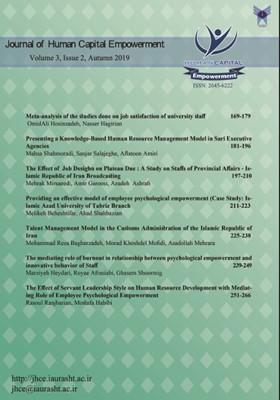Providing an effective model of employee psychological empowerment (Case Study: Islamic Azad University of Tabriz Branch
Subject Areas : Human Capital Empowerment
Melikeh Beheshtifar
1
![]() ,
Ahad Shahbazian
2
,
Ahad Shahbazian
2
![]()
1 - Management, Humanities, Islamic Azad University, Rafsanjan, Iran
2 - Islamic Azad University
Keywords: Organizational Culture, Monitoring system, "Psychological Empowerment, Management System, Islamic Azad University",
Abstract :
The research method is qualitative-quantitative.The statistical population consists of two groups; the first group consists of experts in the field of psychological empowerment of human resources whose number is unknown and scattered throughout the country; 15 of them were selected by purposeful sampling and were selected in the section. Modeling and design were used in their view.The second group consisted of all staff of Islamic Azad University of Tabriz (1100 people). According to Cochran formula 285 people were selected as sample. Data were collected through in-depth interview and in the fitting phase of the model, Employees' Psychological Empowerment Questionnaire, whose content validity and reliability were 91.5% and 94.6%, respectively.Exploratory and confirmatory factor analysis methods were used for data analysis. SPSS 21 and LISREL 8/8 were used. The results show that the relationship between organizational culture (0.38), organizational structure (0.48), organizational monitoring system (0.83), organizational reward system (0.56), and organizational management systems (68) The correlation with psychological empowerment was shown to be desirable.The t-test statistic was also larger than the critical value of t at 5% error level (1.96) and showed a significant correlation. Therefore, with 95% confidence, it can be said that all five factors had a significant impact on the design of an effective model of psychological empowerment of staff at Tabriz Islamic Azad University
ابوطالبی، م.، و صادقی بروجردی، س. (1395). تبیین مدل توانمندسازی روانشناختی کارکنان بر اساس سبک تفکر مدیران اداره کل ورزش و جوانان اصفهان، نشریه مدیریت ورزشی، دوره 8، شماره 6، صص 957-975.
امیری، و.، و بیگی،ک.، (1396). بررسی عوامل مؤثر بر توانمندسازی در رضایت شغلی کارکنان (مطالعه موردی: کارکنان ستادی بانک آینده)، کنفرانس بین المللی چالشها و راهکارهای مدیریت و توسعه اقتصادی، امارات- دبی، پژوهشکده مدیریت و توسعه پژوهشگاه فرهنگ و هنر.
باقرسلیمی، س.، و دشمیر، ح. (۱۳۹۷). تأثیر آمادگی الکترونیکی بر توانمندسازی شغلی کارکنان دولت (مطالعه موردی: کارکنان استانداری و فرمانداری های تابعه استان گیلان)، فصلنامه پژوهش های جدید در مدیریت و حسابداری، دوره 4، شماره 11، صص 78-65.
تقی زاده، ه.، و ضیائی حاجی پیرلو، م. (1395). بررسی روابط درونی مؤلفههای توانمندسازی کارکنان با توسعه الگوی ساختاری- مقایسهای، فصلنامه پژوهشهای مدیریت منابع انسانی، سال هشتم، شماره2، صص85-111.
جزنی، ن.، رستمی،ع. (1390). طراحی و توسعه مدل استراتژیک توانمندسازی منابع انسانی در سازمانهای دانشمحور، نشریه پژوهشهای مدیریت منابع انسانی، دوره 1، شماره 3، صص 54-23.
جلالی، ر.، الوانی، س.م.، حسن پور، ا.، و محب زادگان، ی. (1396). شناسایی و مدلسازی عوامل مؤثر بر توانمندسازی مدیران دریایی، نشریه آموزش علوم دریایی، دوره 4، شماره 8، صص 29-14.
حسینی پور، س.و.، سید جوادین، س.ر.، و نظریان، ب. (1397). بررسی رابطه بین جوّ سازمانی نوآورانه و مؤلفههایش با توانمنـدسازی روانشناختی در کارکنان سازمانهای دولتی شهـرستانهای رودسر و املش، فصلنامه توانمندسازی سرمایه انسانی، سال دوم، شماره 1، صص 85-95.
سلیمی ،ج.، و عبدی، آ. (1396). بررسی رابطه بین توانمندسازی روانشناختی و رضایت شغلی معلمان؛ بررسی نقش میانجی رفتار شهروندی سازمانی دبیران مرد و زن مقطع متوسطه آموزش و پرورش (ناحیه 1 و 2) شهرستان سنندج، فصلنامه روانشناسی مدرسه، سال ششم، شماره4، صص 70-98.
شریعتی، م.، ولیپور، م.، و نوبخت، ا. (1395). طراحی مدل توانمندسازی روانشناختی کارکنان سازمان فرهنگی (مورد مطالعه سازمان عقیدتی و سیاسی ناجا)، فصلنامه بصیرت و تربیت اسلامی، سال سیزدهم، شماره 28، صص 75-96.
فراهانی، ا.، کشاورز، ل.، فردوسی، م.ح. (1393). طراحی مدل توانمندسازی روانشناختی کارکنان مبتنی بر ساختار سازمانی و فرهنگ سازمانی نوآورانه در وزارت ورزش و جوانان، فصلنامه رویکردهای نوین در مدیریت ورزشی، سال دوم، شماره 7، صص 87-97.
فیروزفر، ف.، منصوری، ا.، و ولی زیبایی، خ. (1396). پیش درآمدی بر ادبیات مفهومی توانمندسازی روانی اجتماعی، نشریه رویش روانشناسی، دوره 6، شماره 2، صص 206-189.
مشرف، م.، شاهین، آ.، طغیانی، م.، و میرآقایی، م. (1386). طراحی الگوی توانمندسازی روانشناختی کارکنان شرکت گاز اصفهان. پایگاه جامع مدیریت.
موسویان، م. (1391). طراحی الگوی توانمندسازی منابع انسانی در رسانه ملی، فصلنامه پژوهش های ارتباطی، سال نوزدهم، شماره72، صص 93-114.
میرمحمدی، س.م.، پورداوود، ح.، و قاسمی بنابری، ح.ر. (1396). عوامل کلیدی موفقیت توانمندسازی کارکنان. نشریه مطالعات مدیریت بهبود و تحول، دوره 25، شماره 83، صص 113-93.
Avolio, B. (2018). Modeling the Effect of Employees' Psychological Empowerment on Crisis Management Considering the Role of Change Management in Slovak Universities, Origins, effects and development ,Vol 3. p: 155-182. San Diego, CA, Elsevier.
Bavlar. W., & Orsova.Y. (2016). Investigating the Relationship between Psychological Empowerment of Human Resources and Organizational Agility in Sri Lankan Governmental Organizations. Academy of management Executive.
Brown, M. E. (2016). Identifying and Evaluating Factors Affecting Employees' Psychological Empowerment and Its Relationship with Organizational Citizenship Behavior, Academy of Management Executive, Vol 18. p: 69−81.
Deci, E. L. (2018). Explaining the Relationship between Employees' Psychological Empowerment with Organizational Maturity Capacity in Stockholm City Government Offices, Journal of Management Studies, Vol 45(2). p: 402-424.
Minyoung, Ch., Francis, J., Shelley, D.Dionne., Seth, M.Spain., & Chou-Yu, T. (2018). A review of the effectiveness of empowering leadership, The Leadership Quarterly Available online 8 September, In Press.
Morgeson, F.P. (2018), Designing a Model of Employee Psychological Empowerment Based on Organizational Entrepreneurship in Service Organizations in Toronto, European Management Journal, Vol 25. p: 171-184.
Mumford, M.D., Zaccaro, S.J., Johnson, J.F., Diana, M., Gilbert, J.A., & Threlfall, K.V. (2017). Empowering frontline staff and perceived customer satisfaction in Portugal, Leadership Quarterly Vol 11 (1). p: 115-33.
Nursalam, N., Rizeki, D.F., Slamet, R.Y., Muhammad, H., Ferry, E., & Angeline, B. (2018). Development of an empowerment model for burnout syndrome and quality of nursing work life in Indonesia, International Journal of Nursing Sciences, Available online 26 May, In Press.
Sadeghi, S., & Hasani, K. (2013). Relationship between Knowledge Management and Employee Empowerment in the Sport and Youth Organization of Iran, International Journal of Research in Organizational Behavior and Human Resource Management, Vol 1(4). p. 195–209.
_||_

